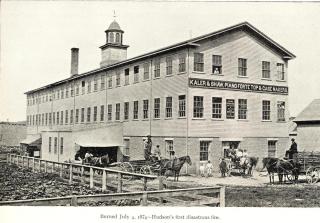Kaler & Shaw Piano Top Factory Fire!

This is the Kaler & Shaw piano top factory located on Broad St. The following story was taken from an article written in the Hudson Pioneer, a weekly newspaper published in Hudson at the time.
"A young boy about six years of age was strolling along Broad St. with matches in his hands. Where near the piano factory he spied an open door and going up the stairs found a huge pile of shavings and laths in the corner. It occurred to him that it would make a splendid bon fire and suiting the action to the thought, lit a match and applied it to the pile, then ran out to call other boys to see the splendid sight. One of the boys was badly frightened and ran to his elders with the story. It was seen that the large timber structure was in immanent danger, and the wild alarm spread along the street to the engine house, the bells upon which were rung as loudly as possible, the time was around 11:30 AM. Being a holiday many people were away from town, so few were ready to man the engines, still the engines were promptly started by the few who came. The whole department was ordered to the river side in the field near the shop and foundry. It was expected that the various force pumps under Mr. Houghton’s control could be brought into action; but unfortunately this was not so. The engineer was not at hand. Meanwhile the three streams from the Assabet proved entirely inadequate in beating back and subduing the flames. Now the peril ceased to be local and the point of danger drifted town wards over barns, houses, and wood yards to shoe factories, the tannery, the depot and churches. One engine was withdrawn to the hydrant by the railroad crossing.
The barn of George A. Cotting, which was close to the factory, was now ablaze. The hose men were not able to stand the pressure. At this point from 100-150 feet of hose burned as firemen were unable to extricate it. The barn quickly burned, and the house as rapidly followed. Sparks and cinders had been sailing towards the village. Every roof was threatened, many were ablaze in patches. Wet blankets, pails of water and fountain pumps were in demand. When the peril first became manifest, telegrams flew to Marlborough, Clinton, Fitchburg, Boston, for help which was promptly made available, though subsequently countermanded with the exception of Marlborough.
The Marlborough engines came rapidly over, under engineer Balcom, and took position, Torrent No. I along side of Houghton No. 2 at the depot, and Okokammesit No.2 with Eureka No. I at the river, the first two to prevent progress of the flames town wards, and the latter two to protect wood and lumber in Kaler and Shaw’s yard and iron foundry of T.W.H. rice, close by. The Marlborough train which arrived opposite the river about 12:45pm was obliged to tarry a full hour before it was regarded safe enough to pass along with it’s load of excursionist bound to Walden pond in Concord. The tired firemen withdrew in detachments to the town hall where they were treated to refreshments furnished by the selectmen and a volunteer corps of women. Everything that could be had was generously offered; coffee, milk, crackers, pressed meat, cake, and cigars, etc. The Marlborough firemen were able to return by the 4:20pm train.
The property loss of Kaler and Shaw was estimated at $50,000, covered by $19,000 worth of fire insurance. Several firemen were hurt while fighting the fire. Probably over half the firemen were away from home at time of alarm. The structure was built in March, of 1868, then 160’ X 35’ and three stories high for George M. Guild and Co, of Boston manufacture of piano cases. In the same year the business was purchased by the foreman, S.J. Kaler, who ran it for a while and was then joined by J.H Shaw, a fellow workman and employee. A showroom was added in June 1874."

